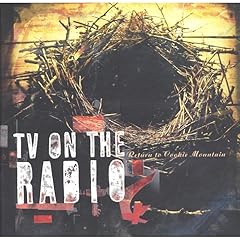
The music, nay, ethos of TV On The Radio - intricate, playful, atmospheric and multitextured, packed with ideas and explorations - now exists somewhere beyond the template of the vast majority of alternative rock in the US, and indeed anywhere. It's been abundantly clear since the Young Liars EP that here is that rare band whose influences are hard to pin down because they are so intrinsically woven into the fabric of their own ideas and ideals, which themselves reach well beyond the self-imposed limits of what most of this side of the music stratosphere that we deal in feel comfortable within. In America this was released on Interscope, the label Dr Dre has planned beat-driven world domination and reshaping from these last fourteen years; in Britain they belong to 4AD, past employers of the likes of the Cocteau Twins, Pixies, This Mortal Coil and Ultra Vivid Scene. In both cases it fits, on the one hand extending the vocabulary of the area they've emerged from, on the other ploughing their own highly distinctive and shape-shifting furrow. Enough of the extensive vocabulary: Return To Cookie Mountain is our choice as album of the year through sheer force of ideas coming off and adaptations from other spheres being interwoven into the sound to create this year's most exhilirating full album experience.
In fact, we join the record with some very R&B styled beats, if more Timbaland stutter than Dre swagger, before being joined by a twanging sitar-like guitar and a warped semi-orchestral sample before Tunde Adebimpe's fried preacher man voice hoves into view for the first time. It's hard to credit given that voice, but it's David Sitek's latest of many queasy, packed but airy soundscapes that stars, a very odd version of Technicolour sounds incorporating static, motorik beats, treated guitar sounds out of the Kevin Shields scrapbook and stuttering electronic beats, fuzzing in and out of focus and occasionally seeming to fill every available gap at the front of the mix. The washes of near enough white noise are used to complement Adebimpe's declamatory style - there's fewer of the spooky vocal harmonies of Desperate Youth, Bloodthirsty Babes in evidence, although Kyp Malone's counter-harmonies are still in evidence - but here his vocal tone is oddly downbeat amid this whirlwind, Adebimpe declaring "I was a lover, before this war" in Prince falsetto in what passes for a chorus. It doesn't signal that this will be a particularly easy listen, as if you couldn't guess already, but it sets the stall out for the parameters of what this record can do. Despite such loops and points the full time addition of bassist Gerard Smith and drummer Jaleel Bunton doesn't so much anchor the sound back down as contribute to the sense that, while there are standard musical roots here, they merely act around them. Attempting to tether the rhythm down of Hours, amid the flutes, plinking piano and Kazu Makino of Blonde Redhead somewhere in the swooping vocal patterns, would be tricky. Province takes an almost stately wander through desolation "holding tenderly to what remains" with David Bowie taking the bottom end of the vocals with the odd pulse, extra handclap rhythm and deep tinkling piano in the right channel. Having examined itself and the world around, the album then gets on with trying to decipher a bloody, and bloody-minded, mess in Playhouses, a near relative of glorious post-Desperate Youth standalone single New Health Rock with its buzzing guitars, disturbed bed of noise, curiously funky undertow and percussive indebted nature, albeit with a midsection featuring what sounds like an attempt to play cello with a road digger. Wolf Like Me, the single and originally mooted as opening track, has the strongest connection to their previous work, providing the mainline to spiritual future punk - and we mean spiritual in the vocal style rather than any religious connotations - while A Method, which is topped and tailed by a spot of Dixon Of Dock Green whistling, resuscitates the other part of their early promise, that of a vocal-led avant-garde Inkspots, before mechanical clicks and disembodied percussive noises provide as much lead bottom line as Malone's wordless echoing behind Adebimpe at his most icily emotional. Dirty Whirl appropriately swirls within an approximation of how a modern studio would approach doo-wop music while Adebimpe's often cryptic lyrical imagery turns in on itself. By the end Wash The Day sounds like people who have given everything firing themselves up for one last eight minute shapeshifting push at the white noise monolith, containing tiny musical references to earlier tracks, an oddly lilting flute track across the metallic rhythm's harshest moments and lyrics at their most inscrutable ("I bought you flowers from the dying woods of Brazil this little bird...making out so high in the backseat of a car bomb under carcinogenic sun") before a combination of bells, ringing guitar and eventually overpowering static bring the whole experience to a close. Even when hitting Desperate Youth paydirt, TV On The Radio used to be easier to admire than love. With Return To Cookie Mountain they haven't exactly become much more accessible, but the sheer effort and attention to detail put into poking at the boundaries, while never straying into the realms of self-indulgence by knowing where to turn it down and when to stop each song, transmutes into a record that exists in nothing but its own world of possibility, and for the vast majority of its part takes the listener with it.
LISTEN ON: Province
WATCH ON: Wolf Like Me on Letterman; Dirty Whirl live in Seattle; some sort of weird viral thing
READ ON: Remix Mag talk David Sitek through the technicals
No comments:
Post a Comment